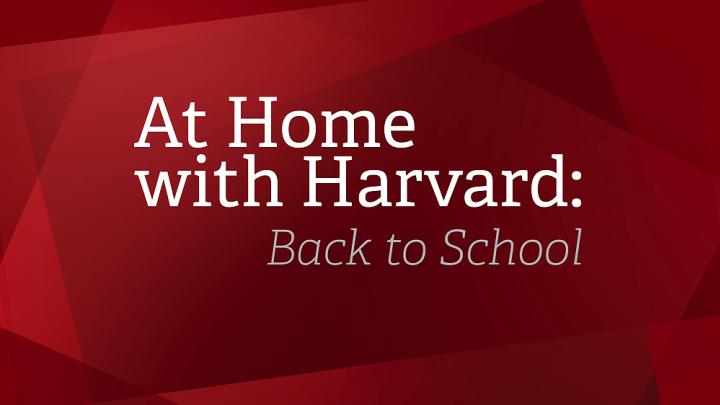This round-up is part of Harvard Magazine’s series “At Home with Harvard,” a guide to what to read, watch, listen to, and do while social distancing. Read the previous selections, featuring articles about climate change, racial justice, movies and theater, and more, here.
This week marks the beginning of the 2020-2021 school year—one unlike any other. Campus is filled only 25 percent, and while some first-years have moved into their dorms, their freshman experience will be vastly different from the normal. Below, we’ve compiled our coverage of some memorable orientation events from the past, as well as some very real, genuine reflections on what it's like to begin college.
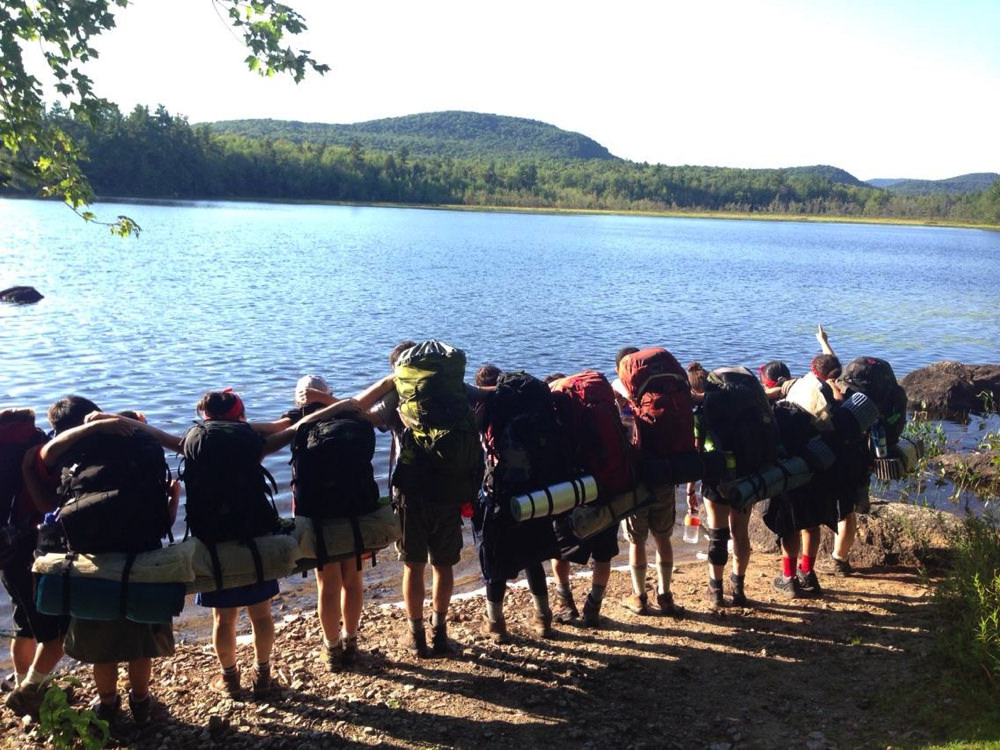
A FOP group looks out over a lake in New Hampshire, August 2015.
Photograph courtesy of FOP
“Our program’s roots date back to the late 1970s, when then-dean of freshmen Henry Moses decided that one of the best ways Harvard could help first-year students transition to college was to start by removing them from campus,” writes Kenton Shimozaki ’19 in his reflection on the pre-orientation trips that take anxious incoming students out into the wilderness to get to know each other and themselves. I would have loved an experience like this when I was starting college. Before freshmen begin shopping for classes and their social and study calendars fill up, they spend five days in the woods, learning how to pitch camp and telling stories around the fire, led by upperclassmen like Shimozaki as part of the First-Year Outbound Program. “I wish we could give every incoming first-year an experience like FOP,” he writes, noting that the program has struggled with racial and socioeconomic diversity. The wilderness, he says, is where students “start finding their own paths.”
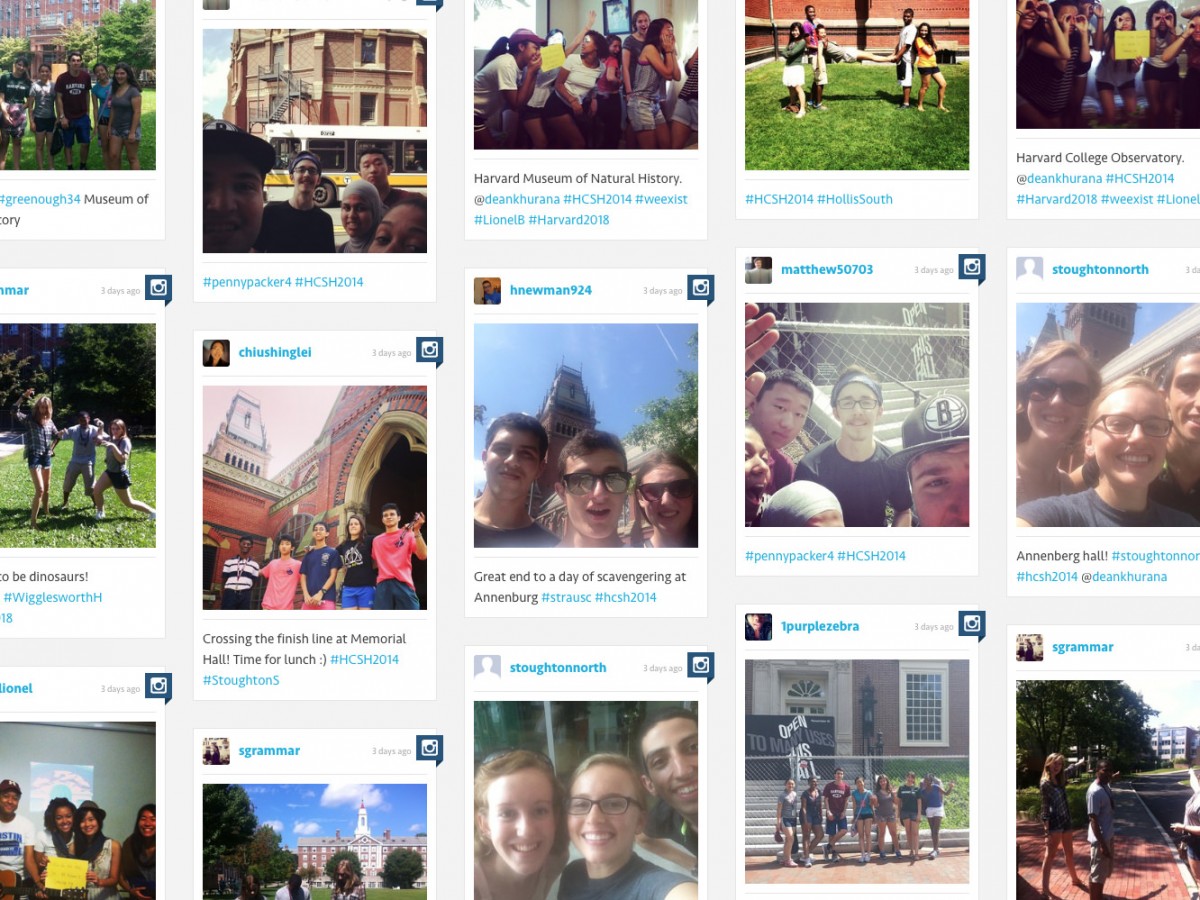
A screen shot of the class of 2018’s Instagram Scavenger Hunt posts.
In 2014, incoming freshmen were given a new challenge to begin the year: an Instagram scavenger hunt intended to introduce the newcomers to campus and to each other. Dean of the College Rakesh Khurana doled out clues on his own Instagram feed, and students crisscrossed the Yard and Harvard Square, rushing to photograph themselves in front of the Loeb Drama Center, the Harvard College Observatory, and even the front yard of then-dean of freshmen Thomas Dingman. “More than a few contest entries included shots of freshmen posing with the dean, mostly in front of his white picket fence.” The winning team was rewarded with a private meal with Khurana and his family.
~Lydialyle Gibson, Associate Editor
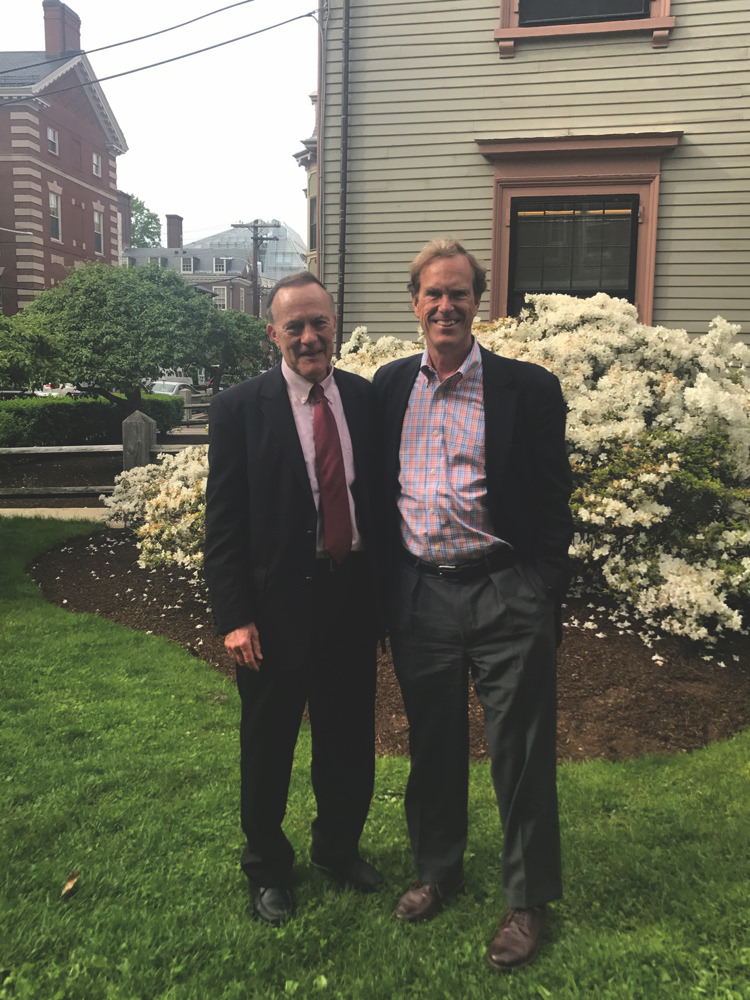
William Fitzsimmons and Thomas Dingman outside the then Freshman Dean’s Office
Photograph by LC/Harvard Magazine
Thomas Dingman, who a few years ago retired as dean of freshmen (a position that was retired along with him), was a force throughout my four years at Harvard. First-years were welcomed to their new home at Harvard by his warm, good-natured presence and eagerness to get to know students of all backgrounds. I remember him ambling around Annenberg, the massive freshman dining hall, looking for students to chat with, especially those who didn’t yet have friends to sit with or looked unsure about their place at Harvard. I loved talking to Tom for this exit profile, “After Five Decades, Dean Dingman Bids Harvard Farewell,” just before his departure, and anyone who remembers him from their time at Harvard will enjoy it, too.
~Marina Bolotnikova, Associate Editor
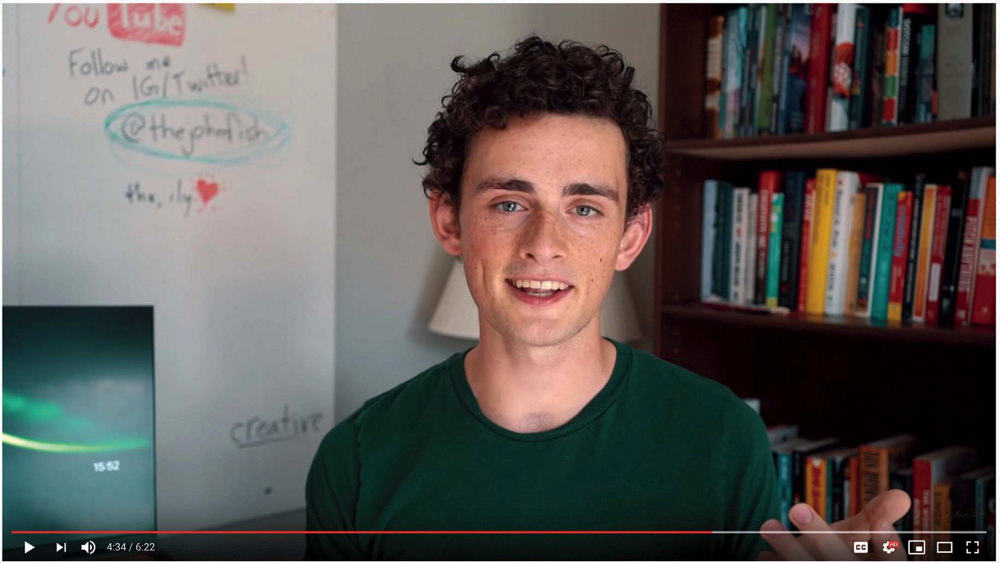
In “Taking Time Off When I’m Most Inspired,” Fish explains the benefits of rest to his nearly 600,000 followers.
Courtesy of John Fish
I have loved watching John Fish’s growth from Harvard freshman to upperclassman discerning how he wanted to forge his path at the University. His most recent YouTube video (as of September 4) reveals that, after taking time off, he’s coming back to Harvard to take online courses this fall (as a junior). Fish is “Figuring It Out,” just as we all are.
~Kristina DeMichele, Digital Content Strategist
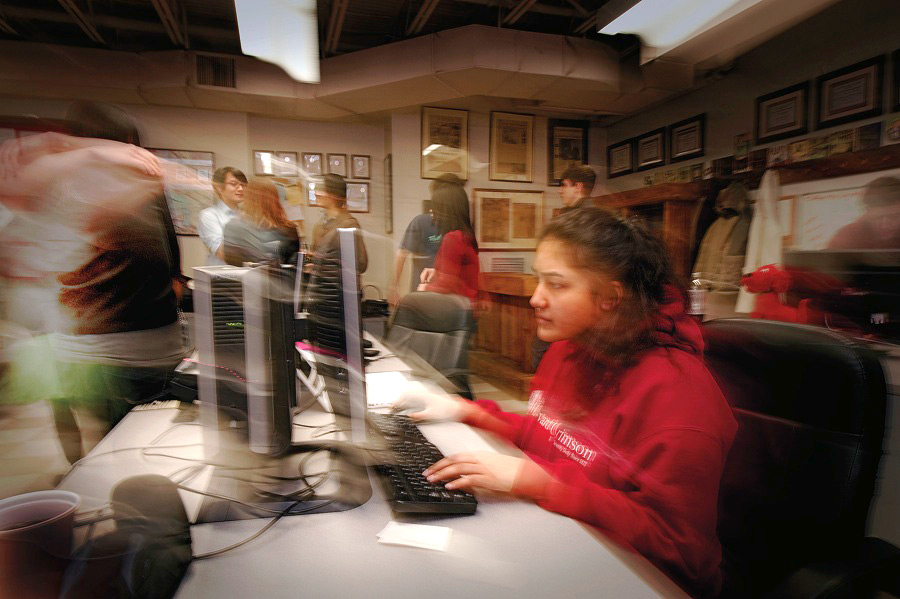
Late at night, Harvard Crimson staffers put to bed the last issue before winter break.
Photograph by Stu Rosner
In her September 1 Convocation remarks to the College class of 2024, dean of undergraduate education Amanda Claybaugh cautioned against succumbing to “busy culture”: students trying to do too many things “in part because they want to, and in part because they feel they have to.” Giving in to that temptation, she warned, leaves students “racing from one thing to another, without enough time to relax or rest, and with no time at all to deal with unexpected challenges, no time to recover from an illness, or fix a crashed hard drive, or heal a broken heart.” The problem is not a new one. In “Nonstop,” Harvard Magazine’s Craig Lambert documented the “superhero” undergraduates who attempt to do “3,000 things at 150 percent.” He began, “You wake up each morning with a fever; you feel like a shadow of yourself. But no time for sickness today—the Adams House intramural crew has one of its thrice-weekly practices at 6 a.m., and you…will…row. Some mornings, you watch the sunrise from Lamont Library after hitting your study groove there around 11 the night before and bushwhacking through assignments during the quiet time between 3 a.m. and 5.” Sound familiar? That was a real student’s schedule—and not a prudent one, especially in a year of persistent pandemic.
In emphasizing the basics of taking “enough time to relax or rest,” Claybaugh landed upon another undergraduate temptation: not sleeping. The magazine’s Undergraduate Fellow Arianne Cohen ’03 devoted one of her columns to the problem, “Sleeping Smarter.” She recalled, “Early freshman year, in order to experience all that college had to offer, I decided to cut sleep out of my life entirely.” It didn’t go well: “Mood and motivation, both of which are pivotal in the stressful environment induced by the Yard, are the first to be affected by lack of sleep; not to mention intellectual accuracy…which plummets without adequate rest; and general energy, a much-needed source of strength to get students through 16-hour days of classes, meetings, practices, and homework.” Her column was adopted for use on campuses nationwide, and resonates today. So students, get some sleep!
A decade after graduating, Adam Goodheart ’92, one of the preeminent undergraduate writers who graced these pages, revisited his College experience in ways amusing, rueful, and important—if not all applicable in a socially distanced semester. His “Freshman Plus 10” is eternally evocative:
“Harvard seemed to offer the sweetest parts of both youth and adulthood, all mine for the taking.
“Once I arrived there for real, of course, I discovered that not all of it could be mine, not by any stretch. Very quickly, like everyone else, I found my way into one particular Harvard, which included certain things but not others, certain people but not others, certain dorm rooms and lecture halls and gathering places, while others—entire buildings even—would for the next four years remain as much a mystery to me as before I’d ever arrived. And this is the Harvard that, for better or for worse, has stayed with me ever since.”
~John Rosenberg, Editor
More from “At Home with Harvard”
- Spring Blooms: Your guide to accessing the Arnold Arboretum as the seasons turn in Boston
- Harvard in the Movies: Our favorite stories about Harvardians on screen
- The Literary Life: Our best stories about the practice and study of literature
- Night at the Museum: Our coverage of Harvard’s rich museums and collections
- Nature Walks: Walking, running, and biking in Greater Boston’s green spaces, even while social distancing
- Supporting Local Businesses: Our extensive coverage of local restaurants and retailers, and how you can support them during this time of crisis
- Medical Breakthroughs: Our best stories going deep into the ideas and personalities that will shape the medical care of tomorrow
- Rewriting History: From race and colonization to genetics and paleohistory, our favorite stories about the people reshaping the study of history
- The Climate Crisis: Highlights from our wide-ranging coverage of the environment
- Crimson Sports Illustrated: With 2020 winter sports ending early and the spring collegiate season wiped out almost entirely, we look back at Crimson highlights from past years.
- The Real History of Women at Harvard: Stories covering the admission of women, the Harvard-Radcliffe merger, the rise of women in the faculty ranks, Harvard’s first woman president, and more
- The Undergraduate: Our favorite student essays on the undergraduate experience
- The Secret Lives of Animals: From zoology and evolutionary science to animal-rights law to the joys of local wildlife, a selection of our favorite animal stories
- Harvard on the Small Screen: Our coverage of the creators, writers, and actors in your favorite TV shows
- Extraordinary Lives: From our “Vita” section, extraordinary profiles of authors, artists, activists, and more
- Great Legal Minds: Our favorite stories on the minds reshaping American law
- Harvard History through a New Lens: Some of our most notable stories about obscure, dark, or surprising episodes in Harvard’s history
- Health and Fitness: Our extensive coverage of Harvard’s breakthough health and wellness research
- Pride Month: Stories of Harvard's LGBTQ life, research and history
- Inequality in America: Stories of America’s extreme inequality
- The Immigrant Experience: A selection of our writing on immigration, displacement, and the global refugee crisis
- Harvard in the World: Harvard Magazine’s coverage of the University’s expanding global reach
- Theater & Broadway: Harvardians take to the stage.
- American Democracy: Our coverage of the nation's ailing democracy
- Traveling for the Story: Stories from all over the world
- Library Treasures: Our coverage of Harvard’s libraries, more relevant than ever in an online world
- Women in Sports: Celebrating women athletes raising the bar in their sports
